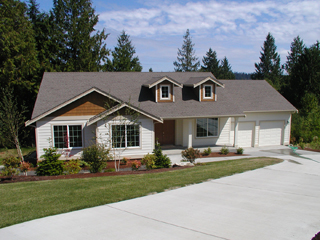|
Subscribe / Renew |
|
|
Contact Us |
|
| ► Subscribe to our Free Weekly Newsletter | |
| home | Welcome, sign in or click here to subscribe. | login |
Real Estate Buzz
| |
 Lynn Porter Real Estate Editor |
April 9, 2009
Real Estate Buzz: Local fund turns distressed homes green
Real Estate Editor
A Seattle-based firm has started a fund to buy distressed single-family homes in the Emerald City, and then make them green.
G2B Ventures, a startup founded by Aaron Fairchild, hopes to raise $50 million from private investors to purchase roughly 600 foreclosed or undervalued homes in Seattle. It will make cosmetic improvements and do energy retrofits, and then rent out the houses. They will be sold when the market improves.
The retrofits include “non-sexy stuff,” such as sealing the home's envelope, adding insulation and installing low-flow showerheads and toilets, said Fairchild.
G2B expects renters and buyers will be willing to pay more to live green and have lower utility bills.
G2B's research shows green homes sell and rent for more than non-green ones, yet the industry hasn't taken advantage of the potential for greening and repositioning distressed homes, Fairchild said. A few funds have just started to focus on that niche, he said.
“There's nothing out there right now capturing the existing home market,” he said.
G2B's Efficient Real Estate Investment Fund may also buy smaller commercial buildings and multifamily projects and energy retrofit them, he said. If it can get good deals, he said it may also purchase land on which it would build green developments.
Fairchild said his background is in sales and financing of residential real estate in the Puget Sound region. He started out building speculative homes with Nason Creek Construction in 1988. He began working in finance in 1997 at what is now HomeStreet Bank. He worked from 1999 until 2006 as a loan officer at Pacific Crest Saving. While there, he said he developed wholesale lines of lending and hired and trained dozens of loan officers. His father founded Columbia Mortgage, which evolved into Pacific Crest.
Sam Lai, a G2B partner, is an appraiser who has done comps on more than 15,000 homes locally, Fairchild said, which will help the fund value assets quickly and accurately.
Fairchild predicts the Seattle housing market is nearing the bottom, but doesn't expect it to recover to its 2007 highs for another eight years.
Busy time for Real Estate Recovery Services
A former banker who recently started a real estate loan workout and receivership firm in Bellevue said he's been representing single-family and condo developers, but expects retail and office builders and investors to be next.

Tim Patrick founded Real Estate Recovery Services in January. So far he represents six developers. They can't pay their construction loans on residential projects in Pierce and Snohomish counties and in Seattle, he said. Some have two or three projects they're behind on; some have 10 — and numerous lenders. The projects range from 10 to 60 units.
Patrick also expects to work as a court-appointed receiver for troubled commercial real estate projects.
Dismal home sales and the credit crisis have left his developer clients unable to refinance or get replacement construction loans or permanent loans at reasonable rates — or at all.
Patrick said he aims for loan restructuring, but that's not always possible.
“In some cases the lender may take the property back,” he said. “That's a resolution, but it's done in a voluntary manner” to avoid lawsuits or other legal action.
Patrick said he spent 10 years at Seattle-based HomeStreet Bank as vice president and manager of construction and portfolio lending. Previously, he worked at Union Bank of California and Security Pacific Bank, where he said he resolved $300 million worth of troubled commercial real estate loans.
As a banker he's been through two down cycles — in the early 1980s, and in the late 1980s and early 1990s. “This is the worst I've ever seen,” he said.
Patrick sees more work for his firm in the future on retail, office and apartment developments and investments.
“I think it could be fairly extensive,” he said.
Yoga mats and log splitters
When an employee of one tenant in the IBM Building in Seattle needed to do some teaching to get certified as a yoga instructor, building manager Unico Properties offered her space for free at Rainier Square, another of its properties downtown.

That type of customer service — and marketing moves such as offering free movies at the Rainier Square roof park — helps Unico keep and attract tenants, Lamb said.
For its efforts, last year it received the National Commercial Real Estate Customer Service Award for Excellence from CEL & Associates, a real estate consulting firm. Also, tenants' rankings of Unico-managed buildings placed it in the top 1 percent nationally among 6,000 comparable buildings surveyed, earning it a “Best in Industry” distinction from CEL, Unico said.
“If customer service is going to pay for itself, this is that market that it will do it in,” Lamb said.
Sometimes it's tougher than finding space for a yoga class. At U.S. Bancorp Tower in Portland Unico is storing a large log splitter for a law firm tenant that's in the midst of litigation surrounding this piece of equipment.
Port Ludlow tries to entice buyers
The Resort At Port Ludlow and its parent company, Port Ludlow Associates, are offering some interesting incentives to attract buyers to the Olympic Peninsula development.
Here are the enticements offered for some of the homes at the master-planned resort:
• The developer will buy back the home at the original purchase price if the buyer decides to sell within three years.
• Homebuyers won't have to pay their mortgage until the Hood Canal Bridge reopens, expected to be around June 15.
• Buyers get a “substantially reduced” purchase price in exchange for splitting the profit with the developer when they sell or refinance. For example, if a person buys a house for $260,000 and then resells it later for $400,000, the owner will receive about $70,000 and Port Ludlow Associates will get about $70,000. That same house is now $379,000 without the shared equity option.
The resort's seven houses are priced from $349,500 to $699,000.
Miriam Villiard, Port Ludlow Associates project manager, said the incentives are designed to get buyers off the fence by lessening their risk.
The resort is geared toward retirees and pre-retirees, and the area doesn't have an extensive job base, she said.
Sales to Californians have fallen from about 50 percent four years ago to an “insignificant” number now, Villiard said. Some people who want to buy at Port Ludlow can't sell their current homes or have to work longer than anticipated. Homes in the development tend to sell in the $400,000 to $500,000 range, Villiard said, and that market is not moving.
Price drops haven't worked. “People are scared,” Villiard said.
Port Ludlow Associates will hold an open house on Sunday, April 19, from noon to 4 p.m. See www.portludlowresort.com/realestate/findyourhome.php to view the homes with incentives.
Lynn Porter can be
reached by email or by phone
at (206) 622-8272.
Got a tip? Contact DJC real estate editor Brian Miller at brian.miller@djc.com or call him at (206) 219-6517.
Previous columns:
- Real Estate Buzz: New Fannie rule hits local condo projects, 03-26-2009
- Real Estate Buzz: Taking the Hyundai approach to apartments, 03-12-2009
- Real Estate Buzz: Hard work pays off for The Bravern retail, 02-26-2009
- Real Estate Buzz: Properties ‘really starting to feel the pinch', 02-12-2009
- Real Estate Buzz: Justen sees good market for high-end units, 01-29-2009
- Real Estate Buzz: Full speed ahead for Escala condos, 01-15-2009
- Real Estate Buzz: Many apartments will be delayed, scrapped, 01-02-2009
- Real Estate Buzz: Wave of defaults, foreclosures hit in Sept., 12-18-2008



